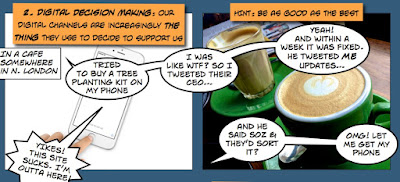Recently, I was given a fantastic opportunity: one of my bosses would pitch my definition of digital transformation to our senior team. If they accepted it, there was a strong chance it would go into the charity's organisational strategy.
My digital transformation definition
- Everyone in the organisation making the most of digital to massively improve their impact
- Using digital tools and techniques (like lean start-up) to put the customer first and make the most of our limited resources
- The organisation being prepared to consider changing what it does, and is, as a result of digital disruption.
Why is digital transformation important?
Digital technologies are one of the major forces for disruptive change in the world today. All organisations need to consider how they respond to the challenge, or risk becoming extinct like Kodak. In many cases, they should consider a transformative response.
One model for constructing a response is the Academy of Digital Business Leaders (ADBL)’s seven digital imperatives.
For our pitch, I decided to use a storytelling approach which would apply them to our context.
7 storytelling tips for digital transformation
1. Decide on your plot
 |
| Digital transformation as a quest |
There are seven basic plots that stories can take. For incumbent organisations, digital transformation arguably naturally lends itself to a quest. This is where the hero goes on a journey which has challenges and difficulties they have to overcome.
But if you are being actively disrupted by digital or a start-up seeking to do the disruption, then a David and Goliath style overcoming the monster plot might be a better option for you.
2. Don’t be afraid to mix it up a bit
Stories can start from anywhere. You can start at the end, and the hero can be telling the tale, or at the beginning and carry your audience with your hero. Or like Quentin Tarantino, you can even be non-linear.
You can combine plots. Our presentation included some elements of an overcoming the monster plot to talk about digital disruption.
Don’t forget to include humour if appropriate.
3. Pick the right format for the job
While the main presentation would be an image led PowerPoint presentation, we were also given the chance to submit a background paper. If we weren’t careful, it might be lost among the other dozen or so papers. So to stand out I produced a two page comic strip outlining the key concepts to build understanding prior to the pitch.
 |
| Digital transformation in comic strip form |
4. Cover the bases
Some people like to listen and imagine. Others like to watch and read. A few are data centric and prefer graphs and numbers. Make sure your story caters for them all.
5. Give options - but make your preferred choice more appealing
We wanted to make our vision of a fully transformed organisation more compelling than one where it was simply better at using digital. To do this, we used more aspirational imagery and wording in our preferred vision.
6. Use metaphors
 |
| A customer centric website |
Metaphors are ace. They allow your audience to build on existing knowledge in a non-threatening way.
For example, our website is often the subject of controversy as different people have a different view of who it should be for and what it should do. I had to say something about the website, but what? and how could it I illustrate it?
I used a metaphor of two people walking in the desert and coming across an oasis to help senior managers picture what a customer-centric approach to our website could look like.
In another slide, we presented the digital transformation choice as a metaphor of a car versus a faster horse with a famous quote from Henry Ford:
 |
| Henry Ford quote. |
7. Give your audience a chance to shine
Our first draft got a very valuable piece of feedback. One boss liked it, but couldn’t see what their role would be. If you can make your audience the hero, or strongly identify with the one in your story, so much the better. I hastily re-wrote the notes for the slides to make it clear.
 |
"The leadership team drove the organisation's understanding
of sunk cost and how to use digital techniques to reduce it" |
Bonus tip: Be unexpected
 |
Listen to data rather than HiPPOs
(Highest Paid Person's Opinion) |
Unexpected is risky. Unexpected is scary. But unexpected also moves people and is memorable. For example, we used a picture of hippos fighting to illustrate the importance of data in digital decision making.
Have you ever used storytelling tips in your digital transformation journey? Do you agree with my digital transformation definition?
Let me know in the comments.





